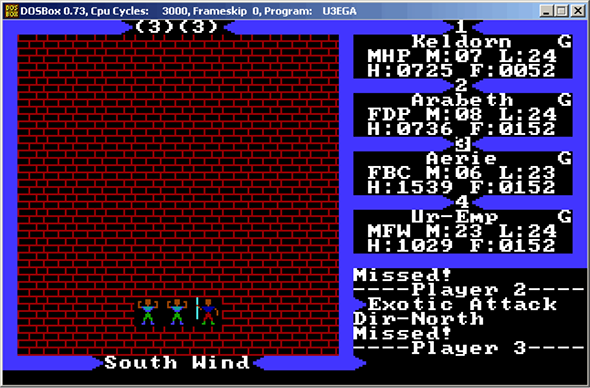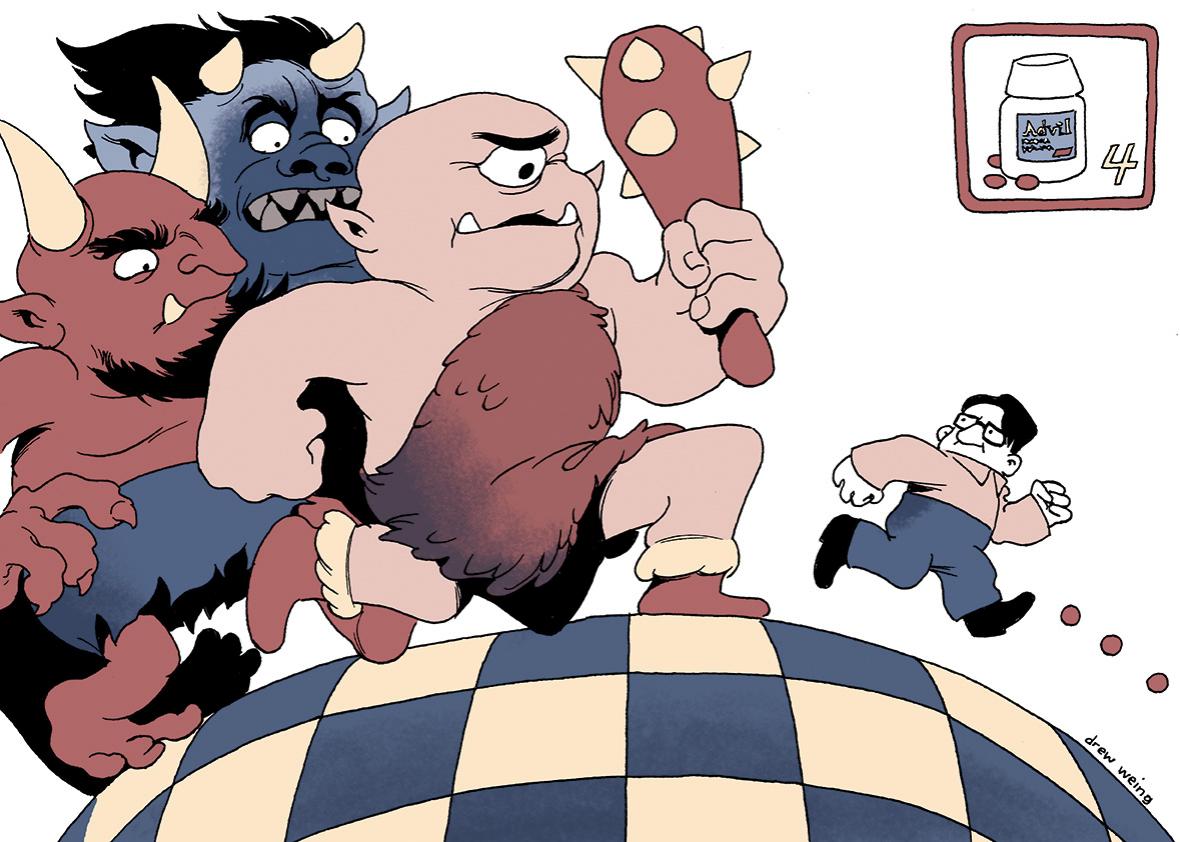Office, in the chair
This is your office. There are books piled all around you, some precariously.
In the middle of the room is your desk. Your computer sits atop it, flanked by two piles of books. One blue book stands out on top of the right pile.
You have a splitting headache.
> swallow advil
You chuck four tablets into your mouth and wash them down with water. That should ease the migraine a bit, before the ibuprofen bores a hole in your stomach.
> who am I?
You are David Auerbach, Slate columnist. You have a book review due by the end of today.
> kill me
You’re indispensable.
> examine blue book
It is Gamelife, by Michael W. Clune, a slim book of about 200 pages. It purports to be a memoir of the author’s 1980s childhood told through the computer games he played. It is divided into seven chapters, each relating a particular computer game to his life at the time.
> examine computer
On the computer you see a Web browser and a document. The Web browser is paused in the middle of the latest episode of Rick and Morty.
> unpause rick and morty
There’s no time for that now. You have a review to write.
> read document
It’s Michael Clune’s résumé. You downloaded it from his website. He is an English professor at Case Western. Judging by the timeframe, he is exactly your age, except he has more degrees, awards, and published books. His 2013 memoir of his addiction, White Out: The Secret Life of Heroin, was named a best book of the year by the New Yorker.
> read chapter one
You pick up Gamelife and settle in for the read.
The first chapter is about Infocom’s 1983 text adventure Suspended, which Clune played at age 7. He doesn’t get very far with it. It frustrates him immensely as his player character repeatedly dies.
> remember suspended
You never played Suspended as a child. It was rated “Expert,” and you knew of its reputation as innovative but notoriously difficult, requiring you to guide six robots, each with only one sensory modality, around a damaged industrial complex. Robot Odyssey was already breaking your brain, and you wanted no more of this busted-up robot nonsense.
> read chapter two
This chapter is about The Bard’s Tale II, a 1986 role-playing game heavily influenced by Dungeons and Dragons. Like most RPGs, it was pretty tedious, consisting of endless battles in twisty dungeon mazes to “level up” your characters so they could survive being bashed by ever more powerful monsters. This process is known as “grinding,” and you never liked it. Clune writes about getting bashed for 490 points of damage when his character has 10 hit points. That sounds about right to you. He doesn’t finish this game either. Interspersed with his characters’ deaths is a series of somewhat meandering childhood memories. Something about how big 490 is and his Christian mother finding the game satanic. You find your attention wandering.
> read chapter seven
You should really read the chapters in order.
> read chapter three
This chapter is about 1983’s Ultima III: Exodus. Clune doesn’t own Exodus, another grind-heavy RPG, but watches his friend Evan play it. Young Michael is captivated by watching Evan hunting down the demon Exodus. Evan’s father is captivated by young Michael. Driving Michael back, Evan’s father asks, “What do you think of the demon Evan’s chasing?” (p. 86) and tries to molest Michael. Wait, what just happened? You snap to attention. You reread the page uncomfortably. The book has shifted into a deeper and more distressing emotional register. Forget Ultima III, this dynamic among Michael, Evan, and Evan’s father has focused the writing. How does it affect their friendship? Does Evan know? What else has Evan’s father done?
You never find out. A few pages later, it’s as though nothing has happened. Evan’s father disappears from the book, permanently. A few pages later, Evan exits as well. Clune returns to his diffuse reflections. “The map-based computer role-playing game is a spiritual device for separating action from ego,” Clune writes, “freeing movement from the narrow prison of character.” There’s some stuff about Paradise Lost too, where Evan is compared to a demon, except Evan is two-dimensional and two-sided and Satan is three-dimensional but one-sided. You don’t really get that part either. Back in Chapter 3, Clune wrote that “3-D is easy. 3-D comes up to you with a smile and an outstretched hand. 3-D is dry land. 2-D is the ocean.” (p. 60) So Evan is water and Satan smiles and shakes your hand? You’re not clear on how this analogy functions. Evan’s dad is definitely a creep, though.
> remember exodus
You didn’t play Exodus either. You didn’t like grinding in endless monster fights, remember? You’re still thinking about the terrible Ultima evening, wondering about Evan and his father. You aren’t thinking about Exodus, which Clune dispatches in a few pages; the game retreats from the narrative, epiphenomenal to the emotional dynamic. Clune has gotten the metaphor the wrong way round. The games would function better as the tenor rather than as the vehicle that Clune wants them to be, since it’s the games that are less familiar than life. Reversing the roles leaves the metaphor forced and unconvincing, trying to pull real-life resonances out of sketchy descriptions of computer games.
You think instead of the CRPG Addict blog, where one anonymous and clearly obsessed man is attempting to play, finish, and rate every computer RPG ever made in chronological order. He’s been at it for five years, and he’s only up to 1991. His addiction is fascinating, and unique: “When I play a CRPG … I write parts of the story that don’t exist, send my characters off on quests that the game doesn’t provide, and otherwise act like a five-year-old playing with his ‘Star Wars’ figures.” Here’s what the blogger has to say about Exodus: “Just before the end you face a battle with—this is definitely an Ultima original—the floor itself. Wave after wave of floor tiles, which you cannot see, attack you.” Invisible moving monster floors: That’s a great detail. Clune’s book is short on great details.

Screenshot via Origin Systems
The Addict’s passion for these games is also on display in a way that you don’t see in Clune’s book. Clune never talks about the thrill of finishing these games (did he?) and the frequent compulsive agony of getting there. He misses that for a significant audience, games become rewarding because the player does battle with their often ridiculous unfairness—a real way in which the games really do resemble real life. “Why do you play these games if they make you so frustrated?” your father once asked you. That question deserves a book too.
> read chapter four
This chapter is about Beyond Castle Wolfenstein, where you direct a player around a bunch of rooms and then kill Hitler. Consequently, young Michael is more interested in World War II than the (still very real-seeming in 1984) possibility of World War III. He concludes: “Computer games about World War II are true because they’re fun. True because of how they’re fun. The truth inside computer games is the secret inside fun.” You turn the page with exasperation.
There’s something bothering you about Clune’s account of Wolfenstein, but you can’t quite put your finger on it.
> remember wolfenstein
That’s it! Wolfenstein was a 2-D game, but Clune repeatedly gives the control scheme for the game as “WAD” for left-forward-right, respectively. That’s a 3-D first-person control scheme! You pull up Wolfenstein on an emulator to be sure: yes, the control scheme is “WADX,” for the four cardinal directions. You’d be inclined to ignore this slip if Clune hadn’t made the 2-D/3-D contrast the underlying motif of the whole book. You debate whether mentioning this error in your review would be seen as nitpicky or as an incisive criticism of the carelessness with which Clune treats his computer-childhood analogy.
> remember trinity
You relax and think back to Brian Moriarty’s 1986 text adventure Trinity, a haunting game about nuclear Armageddon. It’s imprinted on you indelibly. You remember the frightening moment of meeting the old Japanese woman in Kensington Gardens at the beginning of the game, just before World War III starts.
You begin to approach the old woman, but stop in your tracks. Her face is wrong. You look a little closer and shudder to yourself. The entire left side of her head is scarred with deep red lesions, twisting her oriental features into a hideous mask. She must have been in an accident or something.
Your character will later travel back in time to Nagasaki and meet her as a child just before the bomb hits. It was a devastating game. Was it a metaphor for your life? No, you put your life into that game. It provided a new emotional venue, a new emotional context for you to experience that half-mimetic, half-fantastic world as a shadowy player-character who you inhabited. Clune is never transported by these games. Rather, he lugs the baggage of the games into his real life.

Photo courtesy Lauren Voss
> read chapter five
You shake yourself out of your Trinity reverie. This chapter is about the spaceflight game Elite, from 1984. Clune talks about its 3-D wireframe graphics. His parents get divorced, and Tarot cards tell him something bad will happen to him in 10 years, and then he jumps forward 10 years to picture himself overdosing on heroin in Amsterdam. He hallucinates wireframe walls when he overdoses.
You wonder if you are trivializing Clune’s addiction. No, you decide, you aren’t. He is. You doubt that he really thought of Elite at his moment of overdose, because the underlying analogy of the book feels so ex post facto in general. But if so, the games are inessential; they could be swapped with any other thing—like Tarot cards. A structuring metaphor also requires a case for that metaphor, one that Clune is not making.
> read chapter six
This chapter is about Sid Meier’s Pirates!, a game from 1987. Clune’s game-life analogy fits better here since Pirates! is about trade in the West Indies and capitalism hasn’t changed all that much since then. Clune has fantasies of starting up his own black market at school, but they don’t get very far because his would-be partners in crime eat the trade goods. It’s not much of a story; you were looking forward to Clune becoming the Bugsy Malone of his high school.
Clune likes Pirates! too, much more than Elite. His dreams of plunder frustrated, Clune starts getting vague about the magic of computer games: “They teach us about death, about character, about fate, about action and identity… If an insight can’t be made into a computer game, it can’t reach us. It’s not for us. It’s not real. … So there’s a good chance that all possible true ideas are already contained in the history of computer games.”
Hey! Who attached these 10-ton weights to your eyelids?
> remember pirates
One historical fact you learned: Everyone in the 17th century hated the Spanish and tried to rob them blind. Pirates! hasn’t stayed with you like Trinity has, but it was good fun. You played with your siblings, crashed into other ships, nearly broke your joystick waving your rapier around like a feather duster, and sacked Cartagena and Panama about a thousand times. (Die, Spanish, die!) You remember more about Pirates!’ pirates than anything you learned in school.
> read chapter seven
This chapter is about 1988’s Might and Magic II, another RPG. More monster-fighting and grinding, but with much better graphics than The Bard’s Tale. Not enough of an upside for you to have played it, but Clune appreciates the improved 3-D graphics and the day-night cycle in the game, complete with sky. Meanwhile, Clune is a lonely teenager with a crush on a girl. Then it’s back to vagueness: “There’s a warm red heart for people, true. But there’s also another heart. A heart that moves through time. A heart made out of the enduring stuff of mountains or stars. Or pixels. Or sky.” Or treacle.
> read next chapter
There’s no next chapter to read. That’s the end of the book.
> think about gamelife
What gets you is just how shapeless it was, how the individual pieces and motifs didn’t seem to assemble into anything larger even when Clune appeared to be making a concerted effort to make them do so. Many of these games were special, but he’s turned the experience of reading about them into a grind. Instead of a creative effort, a singularly conceived work of art, the book reads as a mechanistic exercise in producing verbiage. Maybe heroin addiction is a grind too. Beyond the flash forward, Clune doesn’t discuss the addiction any further. You’d have to read his first book for that, but you aren’t really feeling up for it.
You think of a different grind, that of game designer Bob Davis on the ill-fated Sierra monster game Time Zone (1982), as diligently chronicled by Jimmy Maher on his Digital Antiquarian blog. Davis was a liquor store clerk and ex-addict who, through happenstance, ended up heading this huge game project. But the money from his prestigious job only drove him back to drugs, and he was broke and in jail within a year. Making Time Zone was a grind. Playing Time Zone was a grind. Davis’ life was a grind, and it ground him down. That story would make for a book in itself: the repetitive, joyless, addictive traps we may fall into in every level of life.
> write nasty review
You gleefully tear into the book that has desecrated your childhood memories, ridiculing Clune’s failed ambitions and blaming him for assorted war crimes, calling him unprintable names as you go. His heroin addiction becomes a particularly juicy target. As a result, the review is unprintable. Slate fires you and you are working at a liquor store by the end of the year.
**** You have lost ****
In 23 turns, you have achieved the rank of Failed Writer. Would you like to start over, restore a saved game position, undo your last turn, or end this session of the game?
(Type RESTART, RESTORE, UNDO, or QUIT)
> undo
[Undone.]
> write sad review
You write a ruminative review covering the failings of the book, your own childhood memories of games, and the uncanny resonances they had for you. You forget the book. You replay some of the games. Your childhood returns to you. The games beckon.
**** You continue to grind ****
—
Gamelife by Michael W. Clune. Farrar, Straus and Giroux.
See all the pieces in the Slate Book Review.
Sign up for the Slate Book Review monthly newsletter.
